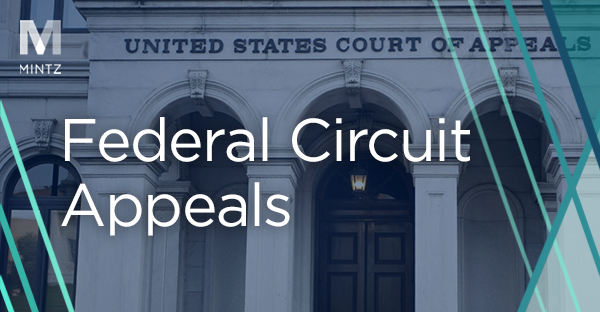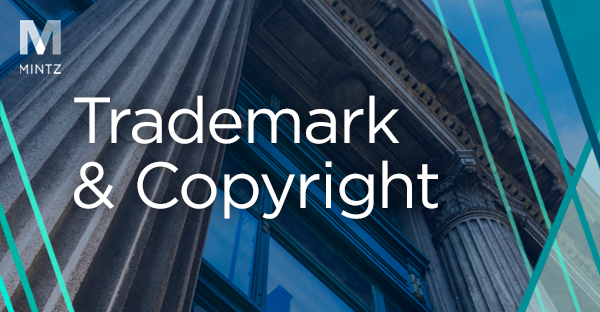
Intellectual Property
Viewpoints
Filter by:
Fractured Federal Circuit Panel Finds That Sovereign Immunity Does Not Prevent Exclusive Licensee from Pursuing Unlicensed Infringement Alone
July 28, 2020 | Blog | By Andrew DeVoogd, Daniel Weinger
Entities with patent-related relationships with state universities scored a victory under the rarely implicated (at least for patent practitioners) doctrine of sovereign immunity. For patent holders, sovereign immunity comes into play when a state actor, for example a state university, enters contracts related to patents, such as in Gensetix v. Baylor College of Medicine.
Read more
Federal Circuit: Licensees’ Failure to Mark Eliminates Entitlement to Pre-Suit Damages
July 27, 2020 | Blog | By Adam Samansky, Peter Cuomo, Matthew Karambelas, Courtney Herndon
Recently, in Packet Intelligence LLC v. NetScout Sys., Inc., No 19-2041 (July 14, 2020), the Court of Appeals for the Federal Circuit reversed a jury verdict of $3.5 million in pre-suit damages and vacated the trial court’s enhancement of that award because licensees of the asserted patents failed to properly mark allegedly patent practicing products.
Read more
Playing Keep-Away: Protecting Your Trade Secrets in a Remote Work Environment
July 22, 2020 | Blog | By Adam Samansky, Nicholas Armington
Companies across the United States quickly rolled out remote work arrangements in response to the COVID-19 health crisis, and as virus caseloads continue to climb, the trend is likely to continue. As working off-site becomes “the new normal,” companies can institute systems and policies to protect their valuable trade secrets.
Read more
Don’t Get Schooled: What You Can Learn from the Wave of Trade Secret Cases That Followed the 2007-2008 Financial Crisis
July 20, 2020 | Blog | By Adam Samansky, Nicholas Armington
The sharp upswing in trade secret litigation triggered by the global financial crisis of the late 2000s taught companies some hard lessons about trade secret theft and disputes.
Read more
IPR and Fast-Moving District Court Litigation: PTAB Formalizes the Analysis for Balancing Efficiency and Fairness
July 17, 2020 | Blog | By Michael Renaud, Daniel Weinger, Adam Rizk, Serge Subach
The Patent Trial and Appeal Board (“PTAB”) has designated two key institution decisions as “Informative.” With these informative decisions, the PTAB has provided guidance on how the PTAB will apply efficiency and fairness factors that guide decisions to institute an inter partes review (“IPR”) when there is a fast-moving parallel district court litigation that may reach trial before the PTAB’s final written decision would be due.
Read more
IT TAKES TWO TO TANGO: The German Federal Supreme Court Acknowledges That Infringer Hold-Out is a Real Problem
July 16, 2020 | Blog | By Michael Renaud, James Wodarski, Matthew Galica
Germany’s highest court has clearly and emphatically placed SEP implementers on notice that hold-out will not be tolerated, and that implementers must proactively share the burden and obligation to timely achieve a FRAND license. An infringer’s conduct during FRAND negotiations is decisively important, and an infringer’s failure to undertake its burden and satisfy its obligations will preclude it from claiming that the patentee acted anti-competitively, or abused a dominant market position.
Read more
The Trade Secret Seesaw: After the Economy Goes Down, Cases Go Up
July 15, 2020 | Blog | By Adam Samansky, Nicholas Armington
An economic downturn usually leads to a rise in trade secret theft and litigation, and the current slump is likely to generate a major surge in cases due in part to the prevalence of remote work.
Read more
The Standard May Rule Them All: Federal Circuit Panel Appears Prepared to Find Standard Is Sufficient to Prove Infringement for SEP Compliant Products
July 9, 2020 | Blog | By Michael Renaud, James Wodarski, Daniel Weinger
Recent oral arguments at the Fed Circuit suggest that the U.S. may be taking steps which would enhance its attractiveness for SEP patent holders looking to resolve licensing disputes. The Federal Circuit heard oral argument on Monday, July 6th, in Godo Kaisha IP Bridge I v. TCL Commc’n Tech. Holdings Ltd., No. 19-2215, that may pave an easier path for owners of standard essential patents (“SEPs”) to prove literal infringement of products that comply with that standard.
Read more
SCOTUS Rules “Generic.com” Marks Are Eligible For Federal Trademark Protection
July 7, 2020 | Blog | By Susan Neuberger Weller
In a landmark decision, United States Patent and Trademark Office v. Booking.com B.V., the Supreme Court of the United States, by an 8-1 vote, affirmed the lower court’s determination that Booking.com could register BOOKING.COM as a trademark.
Read more
Judge Albright to Apple: Yes, You Can Be Sued Outside Northern California
July 6, 2020 | Blog | By Daniel Weinger
Judge Albright of the Western District of Texas (“WDTX”) recently rejected yet another attempt by Apple to transfer a patent case to the Northern District of California (“NDCA”). Judge Albright’s June 19, 2020 order describes how Apple—not plaintiff Uniloc—was attempting to forum shop by seeking to move essentially all of its cases filed in Texas to NDCA.
Read more
Filling the Hole with Common Sense: When Evidentiary Support is Adequate
July 6, 2020 | Blog | By Peter Cuomo, Serge Subach
The Federal Circuit recently reaffirmed a case where common sense was used to supply a missing element in a § 103 obviousness analysis. On June 26, 2020, the Federal Circuit issued a decision in B/E Aerospace, Inc. v. C&D Zodiac, Inc., Nos. 2019-1935, 2019-1936 (Fed. Cir. Jun. 26, 2020) (“B/E Aerospace”) affirming a Patent Trial and Appeal Board (“PTAB”) final written decision finding patent claims invalid in view of a combination of prior art and common sense.
Read more
Motion to add willful infringement charge based entirely on post-suit activity is granted…because it is Unopposed
July 2, 2020 | Blog | By Adam Samansky, Peter Cuomo, Joe Rutkowski
On June 26, 2020, the U.S. District Court for the District of Delaware, in VLSI Tech. LLC. v. Intel Corp, No. 18-0966-CFC, denied VLSI’s motion for leave to amend to add claims for willful infringement of U.S. Patent Nos. 6,212,633 (the “’633 patent”) and 7,523,331 (“the ’331 Patent”) based on pre-suit activity but granted it as to alleged post-suit infringement (which Intel did not oppose).
Read more
Shifting “Sands”: New Facts on the Ground Justify Institution of a Previously-Denied IPR
June 25, 2020 | Blog | By Michael Renaud, Adam Rizk, Daniel Weinger, Serge Subach
In a rare reversal, the Patent Trial and Appeal Board (“PTAB”) reassessed the Fintiv factors in a decision on a petition for rehearing of a previous decision denying institution of an inter partes review (“IPR”).
Read more
Are Design Patents Missing From Your IP Portfolio?
June 23, 2020 | Blog | By Michael Van Loy, Joshua Berk
A design patent protects the visual ornamental characteristics of an article, including consumer and industrial products, medical devices and related tools, sports equipment, jewelry, product packaging, and even web-based and mobile graphical user interfaces and icons.
Read more
USPTO Releases Final Rules on PTA Calculations in view of Supernus
June 23, 2020 | Blog | By Peter Corless
On June 16, 2020, the U.S. Patent and Trademark Office (USPTO) released final rules (the “Rules”) implementing changes to how Patent Term Adjustment (PTA) is calculated in certain circumstances in view of Supernus Pharms., Inc. v. Iancu, 913 F.3d 1351 (Fed. Cir. 2019).
Read more
The Federal Circuit Broadens Application of the Kessler Doctrine
June 23, 2020 | Blog | By Matthew Hurley
Last week, the Federal Circuit invoked the Kessler doctrine in ruling that a district court’s dismissal of the plaintiff’s patent infringement suit against Amazon barred the plaintiff’s subsequent lawsuits against Amazon and its customers in In Re PersonalWeb Technologies, Inc.
Read more
Second Circuit Declines to Decide if Human Skin Can Be a Tangible Medium of Expression under Copyright Law and Affirms Dismissal of Makeup Artist’s Lawsuit
June 22, 2020 | Blog | By Susan Neuberger Weller
In a recent decision from the Second Circuit, Judges Parker, Chin, and Carney side-stepped a novel question: whether human skin can be the kind of "tangible medium of expression" required for copyright protection. Instead, the court held that a photograph of a makeup artist’s application of a makeup design to a human “fixed” the design for purposes of copyright law and affirmed the district court’s dismissal of the appellant Mourabit’s unjust enrichment and unfair competition/misappropriation claims as preempted by the Copyright Act.
Read more
AbbVie’s Enforcement of its ‘Patent Thicket’ For Humira Under the BPCIA Does Not Provide Cognizable Basis for an Antitrust Violation
June 18, 2020 | Blog | By Rich Gervase, Tinny Song
In a recent decision in In Re Humira (Adalimumab) Antitrust Litigation), No. 19-cv-1873, Judge Shah of the Northern District of Illinois dismissed a consolidated class action complaint filed by U.S. purchasers of AbbVie Inc.’s blockbuster biologic drug Humira alleging that AbbVie had prevented manufacturers of competing biosimilar drugs (“biosimilars”) from entering the U.S. market in violation of federal and state antitrust laws.
Read more
No Fishing Allowed: Discovery of Litigation Funding Requires Articulation of Relevance Beyond Speculation
June 18, 2020 | Blog | By Michael Renaud, Andrew DeVoogd, Daniel Weinger, Catherine Xu
PTAB Designates As Informative a Decision Instituting Post-Grant Review for a Design Patent Lacking Ornamentality
June 16, 2020 | Blog | By Brad M Scheller, Meena Seralathan
On June 11, 2020, the Patent Trial and Appeal Board (“PTAB”) designated as informative a July 26, 2019 institution decision granting post-grant review of a design patent for lacking ornamentality. In this ruling, the PTAB provides insight into how it analyzes the unpatentability of a design patent due to lack of ornamentality in post-grant proceedings at the institution stage.
Read more
Explore Other Viewpoints:
- Data Centers & Digital Infrastructure
- AI: The Washington Report
- Antitrust and Federal Regulation
- Appellate
- Arbitration, Mediation & Alternate Dispute Resolution
- Artificial Intelligence
- Awards
- Bankruptcy & Restructuring
- California Land Use
- Cannabis
- Class Action
- Complex Commercial Litigation
- Construction
- Consumer Product Safety
- Corporate Governance (ESG)
- Cross-Border Asset Recovery
- DEI Legal Developments
- Debt Financing
- Direct Investing (M&A)
- Diversity
- EB-5 Financing
- Education & Nonprofits
- Employment
- EnforceMintz
- Environmental (ESG)
- Environmental Enforcement Defense
- Environmental Law
- Environmental, Social, and Corporate Governance (ESG)
- FDA Regulatory
- FDA in Flux
- False Claims Act
- Federal Circuit Appeals
- Financial Institution Litigation
- Government Law
- Growth Equity
- Health Care
- Health Care Compliance, Fraud and Abuse, & Regulatory Counseling
- Health Care Enforcement & Investigations
- Health Care Transactions
- Health Information Privacy & Security
- IP Due Diligence
- IPRs & Other Post Grant Proceedings
- Immigration
- Impacts of a New US Administration
- Insolvency & Creditor Rights Litigation
- Institutional Investor Class Action Recovery
- Insurance & Financial Services
- Insurance Consulting & Risk Management
- Insurance and Reinsurance Problem-Solving & Dispute Resolution
- Intellectual Property
- Investment Funds
- Israel
- Licensing & Technology Transactions
- Life Sciences
- Litigation & Investigations
- M&A Litigation
- ML Strategies
- Managed Care
- Medicare, Medicaid and Commercial Coverage & Reimbursement
- Mergers & Acquisitions
- Patent Litigation
- Patent Prosecution & Strategic Counseling
- Pharmacy Benefits and PBM Contracting
- Portfolio Companies
- Privacy & Cybersecurity
- Private Client
- Private Equity
- Pro Bono
- Probate & Fiduciary Litigation
- Products Liability & Complex Tort
- Projects & Infrastructure
- Public Finance
- Real Estate Litigation
- Real Estate Transactions
- Real Estate, Construction & Infrastructure
- Retail & Consumer Products
- Securities & Capital Markets
- Securities Litigation
- Social (ESG)
- Special Purpose Acquisition Company (SPACs)
- Sports & Entertainment
- State Attorneys General
- Strategic IP Monetization & Licensing
- Sustainable Energy & Infrastructure
- Tax
- Technology
- Technology, Communications & Media
- Technology, Communications & Media Litigation
- Trade Secrets
- Trademark & Copyright
- Trademark Litigation
- Unified Patent Court (UPC)
- Value-Based Care
- Venture Capital & Emerging Companies
- White Collar Defense & Government Investigations
- Women's Health and Technology











